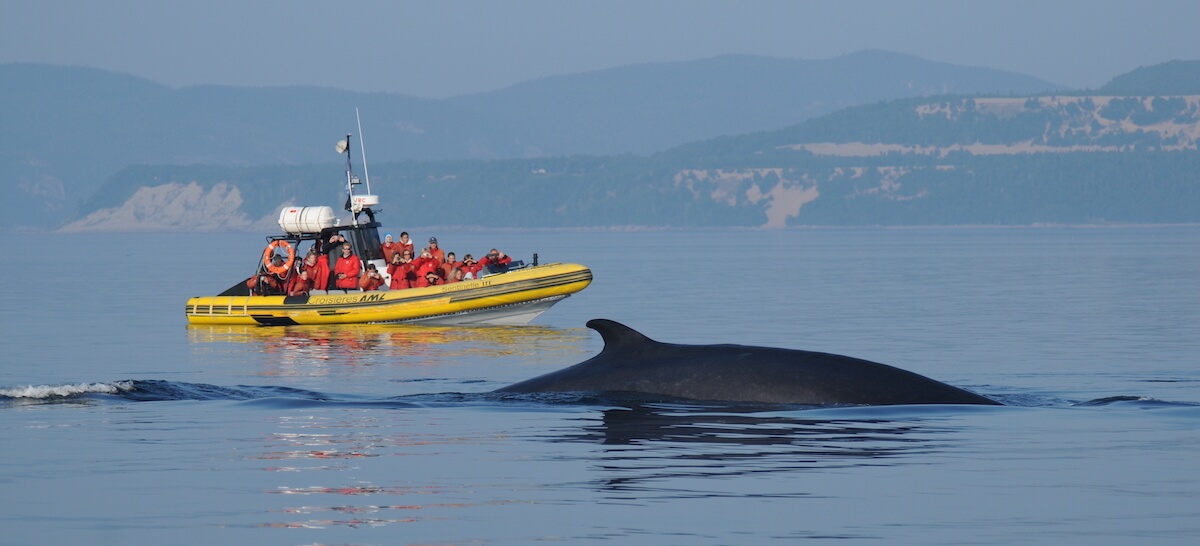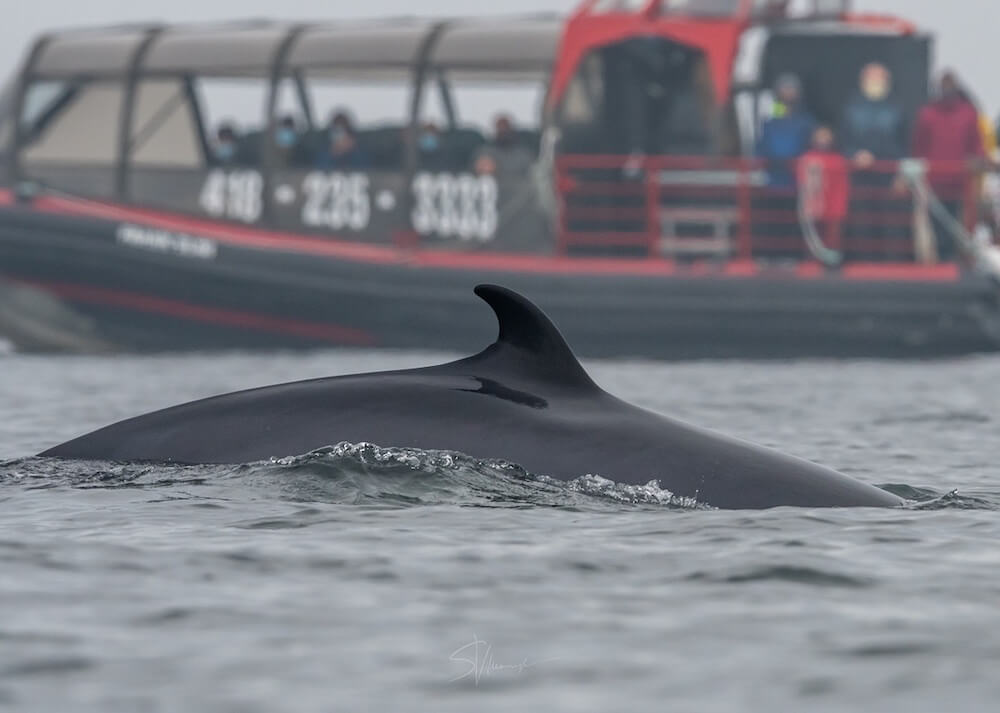Ever since the Saguenay-St. Lawrence Marine Park was created in 1998, a large number of protective measures have been put in place to safeguard marine mammals. On the other hand, can the protection of the marine environment and the enjoyment of whale-watchers on board cruises in this sector be reconciled? This is the question that a team of researchers from the Université du Québec à Rimouski asked themselves in the summer of 2021.
So far, it appears that the visitor experience on whale-watching cruises is even more satisfactory than it was before the creation of the Marine Park!
Can we reconcile conservation and leisure?
Do you know the paradox of being a whale enthusiast? This is “this inner contradiction between the desire to protect, to be the least intrusive possible and not to disturb the animal and the desire to be as close as possible because you’re curious and in total admiration of these majestic mammals,” explains Ariane Tessier-Moreau, master’s student in maritime resource management at the Université du Québec à Rimouski, during a presentation given at the 89th edition of the Association francophone pour le savoir (Acfas).
In response to this paradox, Ms. Tessier-Moreau and a team of UQAR researchers launched a research project with visitors as the focus of their study.
Preliminary results of this experiment tentatively show that no, protection and enjoyment are not mutually exclusive.
Indeed, a slight increase in visitor enjoyment has been noted over the past 20 years, even though marine tourism regulations have evolved since the creation of the Saguenay-St. Lawrence Marine Park in 1998. The main factors studied by the UQAR research team include excursion duration, the presence of other watercraft, the distance at which the whales are observed, relevance of / interest in the topics covered during the excursion, sightings of other animals and how heavily visited the site is. For most of these factors, the average level of enjoyment seems to have increased between 1999 and 2021.
To conduct this study, the team boarded 83 whale-watching cruises in the Saguenay-St. Lawrence Marine Park throughout the summer of 2021. Cruise participants were polled through a questionnaire on the extent to which they appreciated their whale-watching experience.
Passengers were also questioned regarding their expectations. Ultimately, it was determined that 96% of the visitors surveyed strongly believed that cruises should not harm the species present, though 89% wished to see whales, regardless of how far away they were from the animal(s). The majority of respondents also expressed a concern for protecting cetaceans.
Then, the results were compared with data from a similar study carried out in 1999 by Catherine Giroul (in French) of the Université du Québec à Trois-Rivières.
Taking into account these various elements, it can be concluded that Marine Park regulations most likely do not negatively influence the visitor experience. On the contrary, the impact is probably positive!
Close-up on belugas
Another research project also has tourists as its main focus of study. Indeed, through the Beluga Project, researchers from Université de Sherbrooke and Université du Québec en Outaouais are striving to assess the economic impact of belugas in the Saguenay-St. Lawrence Marine Park as well as the value that visitors place on this species.
Whale conservation is an issue that affects an increasingly broad array of other issues, including shipping. In this context, together with a team of engineers, the researchers also are aiming to estimate the costs of speed and noise reduction measures for certain ships and how reasonable these costs might be for society. With the additional costs triggered by ship modifications, it can be expected that the cost of cruises will go up as well. The goal of the Beluga Project is therefore to find out how much people are willing to spend to watch whales in a manner that would be safer for the animals’ well-being.
It is with this in mind that the research group will interview visitors and locals in Tadoussac and Baie-Sainte-Marguerite throughout the summer of 2022. Respondents will include both people who watch whales on board cruises and those who observe them from shore. The answers to this questionnaire will be used to assess people’s openness and gauge their opinion regarding the potential economic and regulatory changes in the Marine Park. For now, the team believes that people would be rather open to spending a significant amount to protect whales provided that the impact can be observed in the short or medium term.
Eventually, the results of this study could be used to better identify the benefits that lower boating and shipping traffic would have on marine mammals and the costs that this would entail.
Do protective measures really have an impact?
It remains difficult to demonstrate the impact that protective measures are having on whales. One thing is for sure, however: These regulations certainly do not mean them any harm! Discussions with visitors help better understand the impact that establishing the Marine Park has had on their experience and in a way justifies the implementation of these restrictions. Thus far, this impact seems positive, which is quite encouraging for the future of the Marine Park and the marine mammals that call it home!







